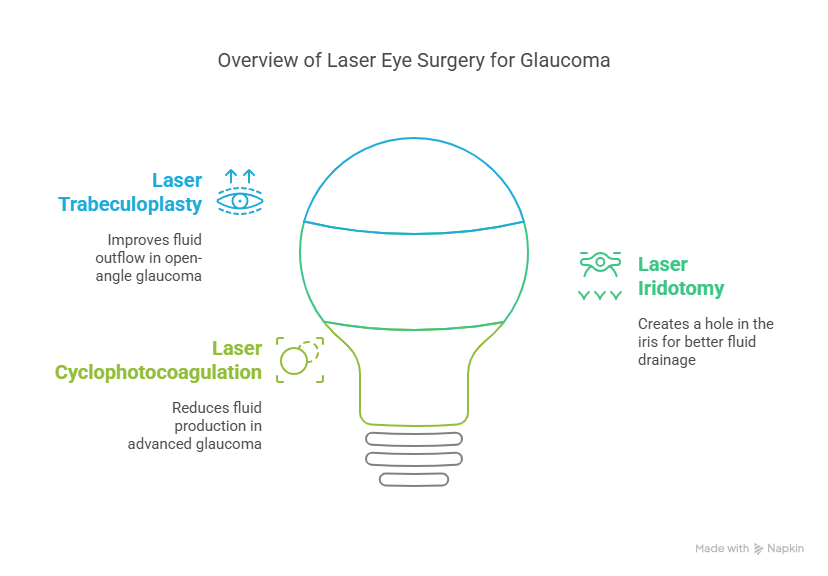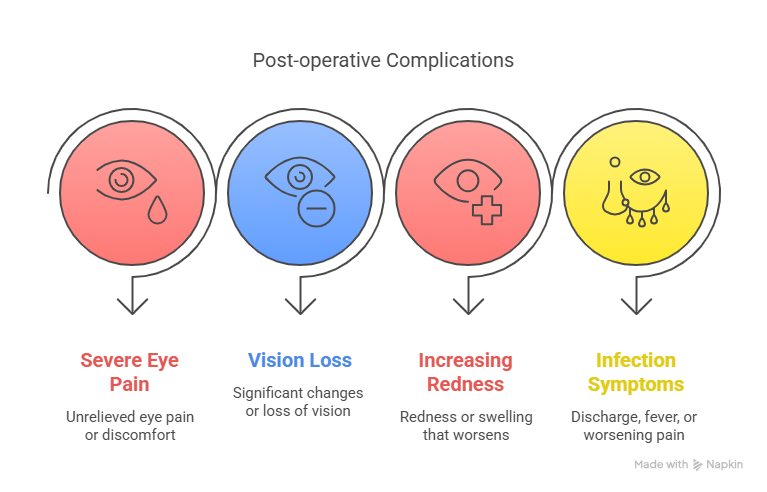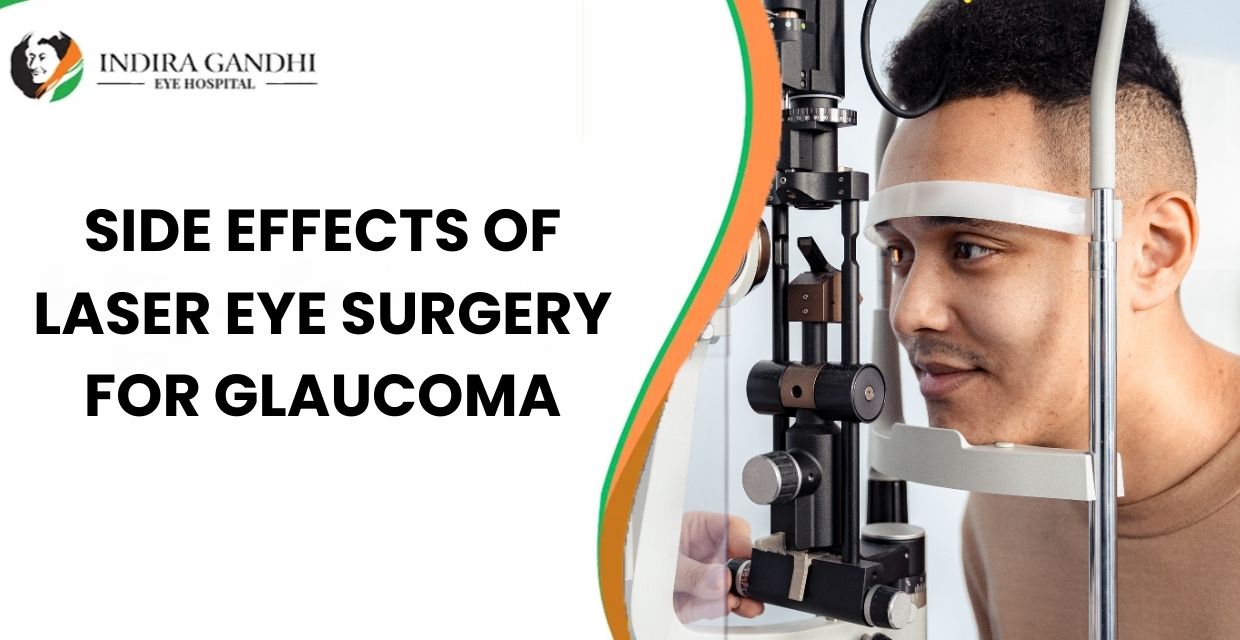|
Getting your Trinity Audio player ready...
|
Laser eye surgery has become a widely used and effective treatment for various eye conditions, including glaucoma. Glaucoma is a serious eye disease that damages the optic nerve, often due to high intraocular pressure, leading to vision loss. Laser eye surgery for glaucoma aims to reduce intraocular pressure and prevent further damage to the optic nerve. However, like any surgical procedure, laser eye surgery for glaucoma can have potential risks and side effects.
In this blog, we will explore the side effects of laser eye surgery for glaucoma, how the procedure works, and what patients should know before undergoing the surgery. By understanding the potential side effects, you can make an informed decision and work closely with your ophthalmologist to ensure the best possible outcome.
What is Laser Eye Surgery for Glaucoma?

Laser eye surgery for glaucoma involves using a focused laser beam to treat the eye and reduce intraocular pressure. The most common types of laser surgery for glaucoma are:
- Laser Trabeculoplasty: This procedure is used for open-angle glaucoma and involves applying a laser to the eye’s drainage angle, improving the outflow of fluid and reducing pressure inside the eye.
- Laser Iridotomy: This is often used for angle-closure glaucoma. A small hole is made in the iris (the colored part of the eye) to allow better fluid drainage.
- Laser Cyclophotocoagulation: This is used in more advanced cases of glaucoma and targets the ciliary body to reduce fluid production within the eye.
Each of these procedures aims to alleviate the symptoms of glaucoma and prevent further vision loss by lowering eye pressure.
How Effective is Laser Eye Surgery for Glaucoma?
Laser eye surgery for glaucoma is generally very effective in controlling intraocular pressure. In many cases, it can reduce the need for medications and help prevent the progression of the disease. However, while the procedure has a high success rate, it does not cure glaucoma. Regular follow-up visits are necessary to monitor eye pressure and ensure the continued health of the eyes.
What Are the Side Effects of Laser Eye Surgery for Glaucoma?
Although laser eye surgery for glaucoma is a minimally invasive procedure, there are still potential side effects that patients should be aware of. Understanding the side effects of laser eye surgery for glaucoma is crucial in making an informed decision about treatment. Below are the most common and less common side effects:
1. Eye Pain and Discomfort
One of the most common side effects of laser eye surgery for glaucoma is mild to moderate eye pain or discomfort following the procedure. This is typically temporary and may last for a few hours or up to a day after surgery. The pain is usually due to the laser’s effect on the eye and the pressure changes caused by the procedure.
- What to Expect: Most patients experience some discomfort, which can be alleviated with over-the-counter pain relievers or prescribed medication.
- When to Seek Help: If the pain persists or worsens over time, it’s important to contact your ophthalmologist for a follow-up evaluation.
2. Redness in the Eye
Another common side effect of laser eye surgery for glaucoma is redness in the eye. The laser can cause temporary inflammation in the eye, which may lead to blood vessels becoming visible, making the eye appear red.
- What to Expect: The redness usually subsides within a few days to a week. In some cases, the redness may persist longer but should gradually improve as the eye heals.
- When to Seek Help: If the redness is accompanied by severe pain or visual disturbances, you should contact your doctor immediately.
3. Blurry Vision or Visual Disturbances
Some patients may experience blurred vision or other visual disturbances immediately after laser eye surgery for glaucoma. This is typically temporary and can occur as the eye adjusts to the changes in intraocular pressure and the healing process.
- What to Expect: Blurred vision can last for a few hours to a few days. Some patients may also notice halos or glare around lights, especially at night.
- When to Seek Help: If blurry vision persists beyond the expected recovery time, or if you experience sudden changes in vision, it is important to consult with your ophthalmologist.
4. Increased Eye Pressure (Intraocular Pressure)
While laser eye surgery for glaucoma is intended to reduce eye pressure, in some cases, it may temporarily cause an increase in intraocular pressure. This can occur due to inflammation or swelling in the eye after the procedure.
- What to Expect: Increased eye pressure is usually a temporary side effect and can be controlled with prescribed eye drops or medications.
- When to Seek Help: If your eye pressure remains elevated for an extended period, or if you experience pain, nausea, or vomiting, immediate medical attention is required.
5. Infection
Though rare, infection is a potential risk with any surgical procedure, including laser eye surgery for glaucoma. An infection can cause severe complications and may lead to permanent vision loss if left untreated.
- What to Expect: Symptoms of an infection include increased redness, pain, sensitivity to light, and discharge from the eye.
- When to Seek Help: If you notice any signs of infection after the procedure, contact your ophthalmologist right away. Infections can typically be treated with antibiotics if caught early.
6. Corneal Edema
Corneal edema refers to swelling of the cornea, which can occur after laser eye surgery for glaucoma. This condition can lead to blurry vision and discomfort.
- What to Expect: The swelling is usually temporary and resolves as the eye heals. In some cases, eye drops or other treatments may be necessary to reduce the swelling.
- When to Seek Help: If the swelling persists or if vision worsens, consult your ophthalmologist for further evaluation and treatment.
7. Loss of Vision or Worsening of Glaucoma
In rare cases, the side effects of laser eye surgery for glaucoma can result in a worsening of the condition or even vision loss. This can happen if the laser treatment is not as effective as expected or if complications arise during the healing process.
- What to Expect: If the surgery does not effectively reduce intraocular pressure or if vision worsens, additional treatments, including medication or further surgery, may be needed.
- When to Seek Help: It’s essential to attend all follow-up appointments with your ophthalmologist to monitor your eye pressure and ensure that the treatment is effective.
8. Cataract Formation
In some cases, laser surgery can accelerate the development of cataracts. Cataracts are a condition in which the lens of the eye becomes cloudy, leading to blurry vision. This is more likely to occur in patients who are older or have pre-existing cataracts.
- What to Expect: Cataracts may develop gradually after laser eye surgery. If this occurs, you may need cataract surgery in the future.
- When to Seek Help: If you notice blurred vision or difficulty seeing clearly, consult your ophthalmologist to discuss potential treatment options.
When Should You Seek Medical Help After Surgery?

It is essential to follow your doctor’s post-operative instructions to minimize the risk of complications. If you experience any of the following, seek medical help immediately:
- Severe eye pain or discomfort that does not improve with over-the-counter pain relievers
- Vision loss or significant changes in vision
- Increasing redness or swelling that does not subside
- Symptoms of infection, such as discharge, fever, or worsening pain
Ready for Clearer Vision? Schedule Your Consultation Now!
Make An AppointmentConclusion
In conclusion, while laser eye surgery for glaucoma is a safe and effective treatment for many people, it is important to understand the side effects of laser eye surgery for glaucoma. Most of the side effects are temporary and can be managed with proper aftercare and follow-up appointments. However, like any medical procedure, there are risks involved, and it is crucial to be aware of potential complications.
If you are considering laser eye surgery for glaucoma, consult with an experienced ophthalmologist at IGEHRC. Our team of experts will guide you through the process, help you understand the risks and benefits, and ensure that you receive the best care possible to maintain your eye health. By staying informed and following your doctor’s recommendations, you can ensure a smooth recovery and a better quality of life.












